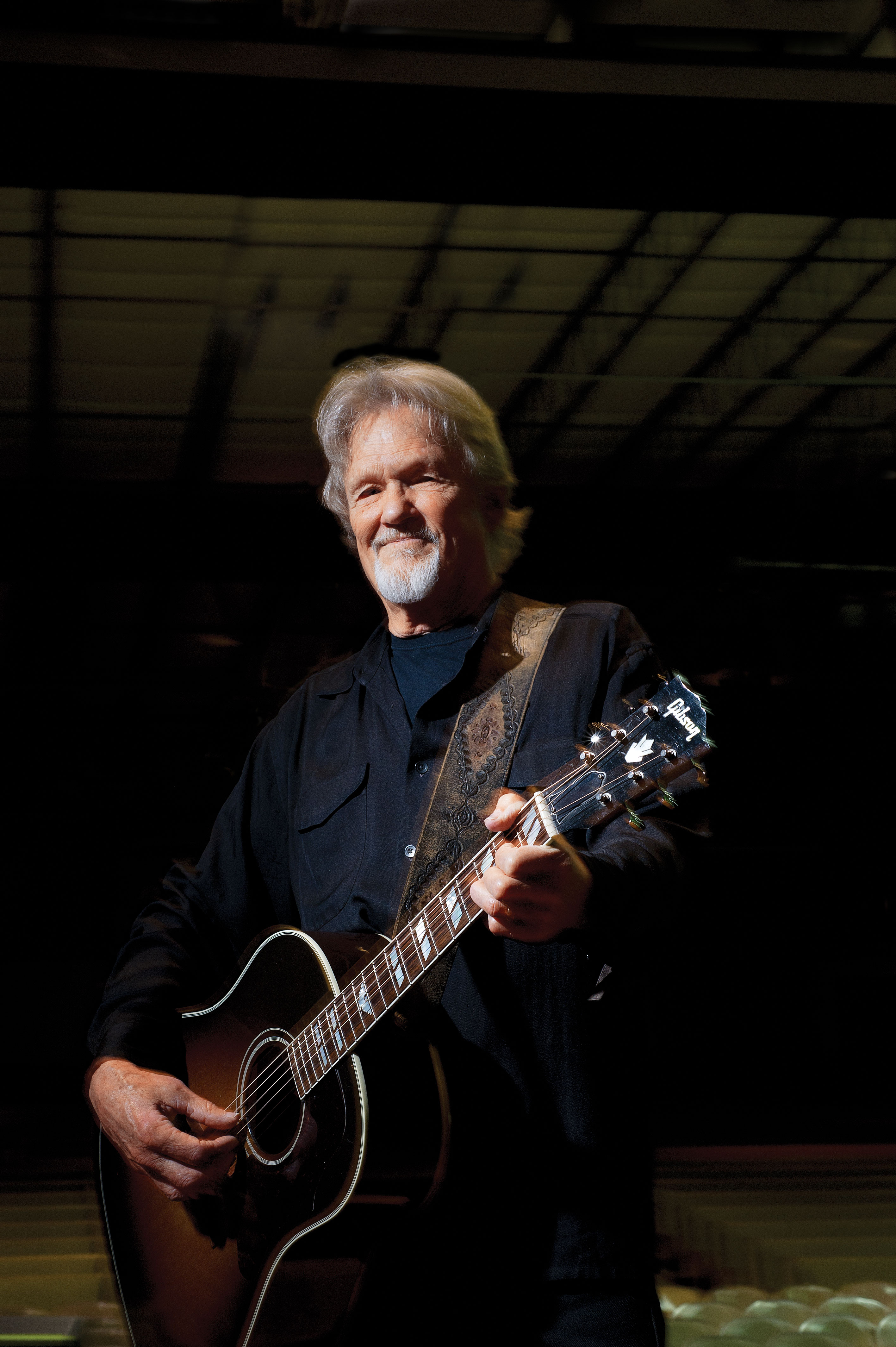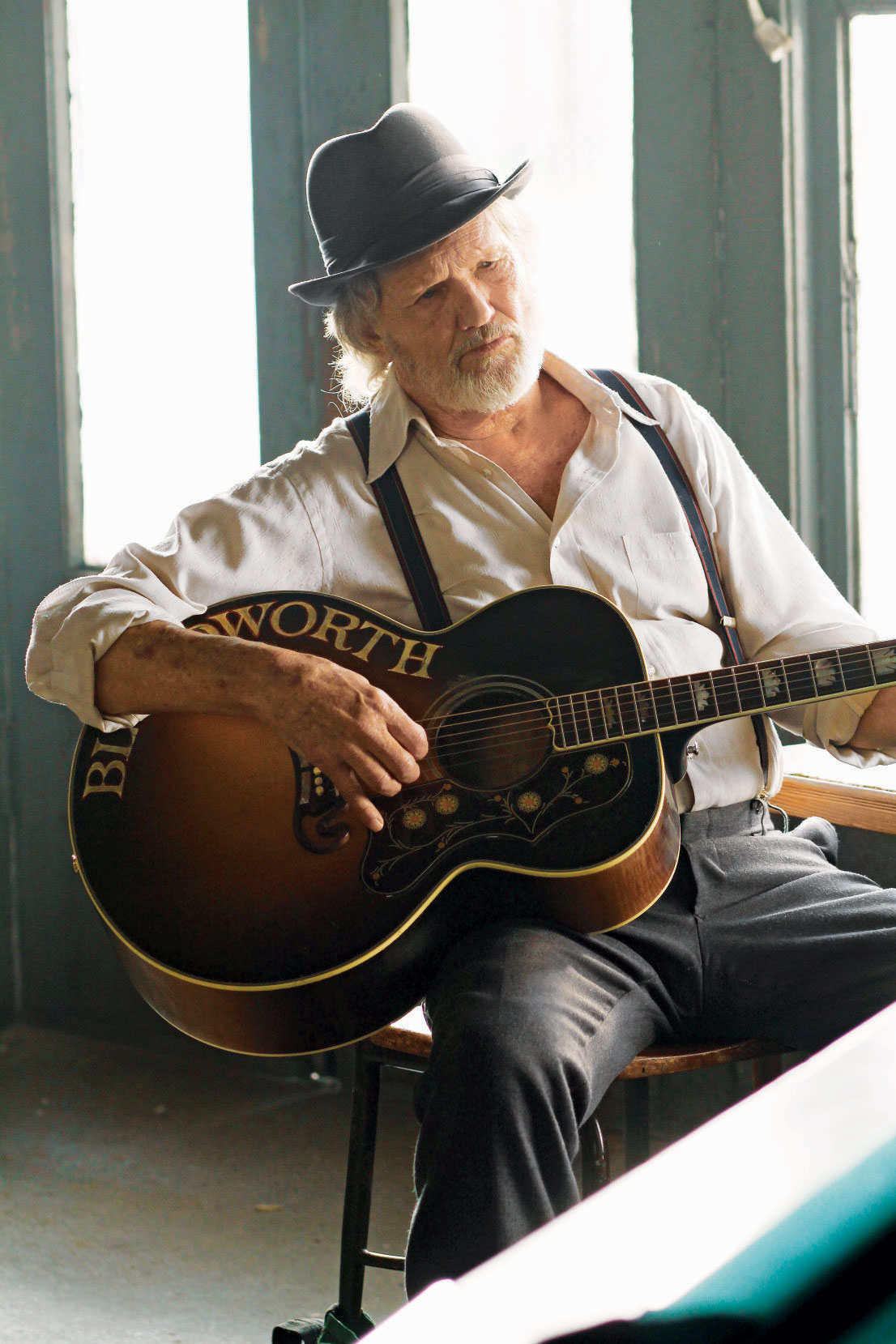If it hadn’t been for Music City, Kris Kristofferson probably wouldn’t have lived to tell his many singular stories.
It’s a Saturday afternoon in a meeting room at a posh Nashville hotel, and Kris Kristofferson, dressed in his trademark black-on-black attire, is looking ridiculously hale and hearty for a living legend of 75. He’s still stoked from the celebratory events of the previous night, when he was greeted with a standing ovation at the Nashville Film Festival before a première screening of his latest movie, Bloodworth. The capacity crowd was there to see the Southern gothic tale of a country singer-songwriter’s return to the family he abandoned four decades ago, and they were there to witness something very special — Kristofferson being presented with the festival’s prestigious Career Achievement Award.
“It’s mighty nice for them to be giving an award like that to an old guy,” Kristofferson says with a wide grin, echoing his brief acceptance speech from the night before. “But, then again, I guess they don’t give it very often to young guys.” The honor was all the sweeter for being presented by fellow music legend Emmylou Harris in the town that has meant so much to Kristofferson. “We in Nashville,” Harris said in her heartfelt tribute, “will always feel that Kris is a favorite son of Nashville.”
Kristofferson’s grin contracts into a wry smile when he’s reminded of something he acknowledged in his acceptance speech: “Nashville,” he said, “saved my life.”
It’s not the first time Kristofferson has acknowledged his enduring debt to Music City. To hear him tell it, it’s all part and parcel of the many dramatic episodes — some of them as gripping as any movie he’s ever made — that make up an altogether remarkable life.
A native of Brownsville, Texas, Kristofferson grew up moving around the country as an itinerant military brat (his father, Lars Henry Kristofferson, retired as an Air Force major general) before entering Pomona College in California in 1954. He excelled in sports — rugby, football, track and field — and proved equally adept as a student, earning a Rhodes Scholarship to the University of Oxford and graduating with a bachelor of philosophy degree in English literature in 1960. During his time in England, he nursed dreams of becoming a novelist, distinguished himself as an amateur boxer, and unsuccessfully launched a career as a singer-songwriter while recording under the name Kris Carson. “They wanted to package me as ‘a Yank at Oxford’ or something,” he says. “But I guess it didn’t take.”
After years of encouragement by his father to sample military life, Kristofferson enlisted in the Army and eventually rose to the rank of captain. He trained to be a helicopter pilot and spent the early 1960s stationed in West Germany with the 8th Infantry Division. In his spare time, he pursued his musical avocation by forming a band. Over time, the avocation evolved into an obsession.
Near the end of his tour of duty, Kristofferson fortuitously discovered that a friend’s distant cousin happened to be Nashville country music songwriter Marijohn Wilkin (“Waterloo,” “Long Black Veil”). So he sent some of his songs to her, she responded favorably, and in 1965 Kristofferson journeyed for the first time to the city that he would come to credit with his personal and professional salvation.
“I think if it hadn’t been for Nashville,” Kristofferson says, “I probably would have ended up going to Vietnam, because I’d been in the Army. I was definitely not doing what I thought I was supposed to do. And I think I probably would have ended up a hopeless alcoholic or something.”
But arriving in Nashville with a connection made all the difference. “It was such an exhilarating experience for me, because Marijohn Wilkin brought me around to a lot of places that a newcomer probably wouldn’t have been able to go. Like guitar-pulling sessions with people like Tom T. Hall and all these exciting songwriters. I’d been writing songs since I was 11 years old, but I hadn’t written anything really good. And I knew immediately that this is where I belonged.”
The sense of belonging didn’t mean things fell into place right away. “I didn’t get immediately successful at it,” he says, “but I never regretted coming here. Looking back on it, it was like bliss being around all these people who were doing what I love to do.”

The early years were indeed lean ones. For a lengthy stretch, Kristofferson supported himself — and his first wife and their two young children — as a janitor at Columbia Studios in Music City. But he didn’t complain about having to do menial work while struggling to establish himself as a songwriter. “Looking back,” he says, “it might look like it was hard to live with. But it wasn’t, because I was around people that I respected. Yes, I was sweeping floors and emptying ashtrays. But I was emptying George Jones’ ashtrays. And sweeping the floor after Bob Dylan or Johnny Cash recorded.”
At one point, he says, Cash carried around the lyrics to a song Kristofferson had written in his wallet. “For me, that was as good as having a gold record or something. The notion that John had enough respect for me to carry that thing around in his wallet was pretty nice.”
Later, Kristofferson put his military training to good use: He landed a job flying helicopters for a Louisiana firm, ferrying passengers back and forth from oil rigs in the Gulf of Mexico. “I’d be gone for a week down in the Gulf,” he says, “and then I’d be back in Nashville for a week, trying to pitch my songs. And it was exhilarating for me. I’d go back down to the Gulf and I’d be on a platform 50 miles out, writing songs when I wasn’t flying a helicopter. And then I’d come back and sing them to people.”
What about the oft-told story that he once landed a helicopter on Cash’s front lawn to sell the superstar some songs? “Well, I admit, that did happen,” Kristofferson says, his face brightening at the memory of his bodacious brass. “But that didn’t do me any good, landing on John’s property. He wasn’t even there in the house at the time. I think he told the story that I got out of the helicopter with a beer in one hand and a tape in the other. But he wasn’t even in the house. And I never would have been drinking while flying a helicopter.”
Then what about June Carter Cash’s claim that when the helicopter landed, she feared Kristofferson was there from the FBI to arrest her husband? “She wasn’t there either,” he insists with a hearty guffaw. “But you know what? I never was going to contradict either one of them.”
Certainly not after the Cashes played such a major role in launching him as a live performer.
By 1969, Kristofferson had begun making a name for himself in Nashville as a songwriter for such country superstars as Roger Miller (“Me and Bobby McGee”), Ray Stevens (“Sunday Mornin’ Comin’ Down”), and Faron Young (“Your Time’s Comin’ ”).
But it wasn’t until Cash introduced him at the Newport Folk Festival — and had him sing onstage during a break in Cash’s own set — that Kristofferson stepped up to the next level.
True story: To get the seriously stage-frightened Kristofferson out before the audience in the first place, June Carter Cash quite literally kicked his butt. “I’m not surprised that I was a little nervous,” he recalls, “because John was putting me out there at a time he was supposed to be out there, for two songs. And the people in charge of the festival didn’t want me out there.
“But it started my whole performing career, because I went over well with the audience. I sang ‘Bobby McGee’ and ‘Sunday Mornin’ Comin’ Down.’ So they asked me to come back the next day, when they had some afternoon shows with songwriters like James Taylor and Joni Mitchell. I remain amazed by my audacity that I would do it. But from then on, I was getting offers to go out and work.”
Within two years, Kristofferson had recorded two albums, the self-titled Kristofferson (later reissued as Me and Bobby McGee) and The Silver Tongued Devil and I (featuring his renditions of songs he’d originally written for other artists as well as original material). He toured extensively, and he performed at the 1970 Isle of Wight Festival alongside Leonard Cohen, the esteemed Canadian singer-songwriter whom he has come to cherish as a close friend. (When he dies, Kristofferson says, he wants the first three lines of Cohen’s “Bird on a Wire” on his tombstone: “Like a bird on a wire / like a drunk in a midnight choir / I have tried in my way to be free.”)
And then came his L.A. debut at the Troubadour, a club date that brought him to the attention of influential music critics — and Hollywood heavyweights. After Robert Hilburn of the Los Angeles Times wrote a wildly enthusiastic review of the up-and-comer, “Everybody in town started coming by,” Kristofferson says. “Sam Peckinpah, Barbra Streisand — people like that. After that, I started getting a lot of movie scripts.” That he had never acted before, or even trained as an actor in college, didn’t seem to deter casting directors. Why? “They must have been hungry for new blood or something.”
Kristofferson earned respectful notices for his acting debut in the title role of Cisco Pike, a 1972 drama about a prematurely washed-up rock musician who’s blackmailed by a crooked cop (Gene Hackman) into selling marijuana seized during a drug bust. The movie led to more acting when such A-list filmmakers as Paul Mazursky (Blume in Love), Peckinpah (Pat Garrett and Billy the Kid, for which he was nominated for a BAFTA Award for best newcomer), and Michael Ritchie (Semi-Tough) cast Kristofferson in prominent roles.
His Hollywood success enabled him to build and sustain a decades-long acting career that continues to parallel — and, from time to time, overshadow — his music career. (A few years back in an interview with Cowboys & Indians, Kristofferson admitted that shortly before a concert in Sweden, “This guy backstage was telling me, ‘You know, there are a lot of young people out in the audience who are saying, “What’s this? Whistler sings?” ’ Because they only knew me as that character from the Blade movies.”)
The real turning point, Kristofferson says, came when he learned invaluable lessons about screen acting from no less a mentor than Martin Scorsese, who directed him in 1974’s Alice Doesn’t Live Here Anymore. “When I read the script for Alice,” he says, “I really didn’t know if I was up to the guy. I felt I didn’t have the acting experience — just the mechanics of it — that probably was necessary.”
But when Kristofferson got the job, Scorsese gave him some key advice he’s never forgotten. “Marty said something to me that was one of the most helpful things that a director ever told me. He said, ‘Don’t worry about what it says in the script when it says, “He says sternly,” or something like that. Just go through and cross out all of the directorial comments and just leave the dialogue. And figure how you would say that, how you would react to that.’ And that changed everything for me.”
That sounds about right to filmmaker Alan Rudolph, who directed Kristofferson in 1984’s Songwriter (as the best buddy of a country music star played by Willie Nelson) and in 1985’s Trouble in Mind (as a mysterious ex-cop and ex-con who serves as the film noir’s antihero). “What’s really smart about Kris,” Rudolph says, “is that he understands what he’s good at and what he can do. You’re staging a scene and ultimately you realize that, unbeknownst even to the person staging the scene, you’re staging around what Kris is comfortable with and what his strengths are. He’s got a terrific range, but he doesn’t have to do a lot to be effective. I saw that in many, many scenes in Trouble in Mind. Whenever the camera got closer to him, the movie got better.”
Flash forward 25 years and 70-plus movies. In 2010’s Bloodworth, an adaptation of William Gay’s novel Provinces of Night, Kristofferson plays E.F. Bloodworth, a none-too-successful musician — “I made a record once, but they didn’t play it on the radio much!” — who returns to his Tennessee home after a 40-year exile, only to find that it’s much easier to communicate with the grandson he never knew (Reece Thompson) than to reconnect with the wife (Frances Conroy) and sons (Val Kilmer, Dwight Yoakam, and W. Earl Brown) he abandoned so long ago.

“For me,” says Bloodworth director Shane Dax Taylor, “Kris was just the No. 1 choice for the role. There wasn’t a backup choice. He’s an icon. When you’re in his presence, you just want to hear his stories. And that’s kind of what [his character] E.F. is all about. His grandson wants to hear all his stories about his life on the road, because he’s so isolated in his small-town Tennessee world. In his eyes, E.F. is a character who’s lived life, so the grandson wants to soak that in.”
It’s a feeling Taylor can relate to. “I have to say, that’s kind of how I feel when I’m sitting next to Kris and he’s telling stories about his life on the road. Or performing with Bob Dylan. Or telling about his experiences trying to establish himself in Nashville while he was a janitor. He really is a living legend. And he can bring that presence, that gravitas, to a role.”
These days, Kristofferson often finds himself most closely identified with a real-life role — as a survivor. He continues to earn raves, entertain audiences, and put out music (Closer to the Bone, a 2009 album of new material, was extremely well received). And he’s already followed up Bloodworth with roles in other upcoming independent films.
And, on the personal side, he has enjoyed the good life for the last 20 years with his third wife, Lisa Meyers, far away from Music City in Maui, Hawaii. “There’s something about the values that they have out there, the people in Hawaii, that’s the same as mine,” Kristofferson says. “Like where I live — the people treat me there like I’m one of them. And they don’t tell anybody that I live there. When people come looking for me, they’ve never heard of me. That’s just great.”
But Kristofferson wouldn’t be enjoying life nearly so much — actually, he admits, he might not be living, period — had he not cleaned up his act before flaming out too young. He quit drinking while appearing opposite Barbra Streisand in the 1976 remake of A Star Is Born and stopped indulging in drugs a few years after that. “I didn’t suddenly turn into a saint,” he says, “but [quitting drinking] definitely put me on the road to recovery.”
He admits he learned from the tragic examples of friends and lovers — including Peckinpah and Janis Joplin — who self-destructed through self-indulgence. But Kristofferson’s hard-pressed to explain why he was able to stop short of the abyss when so many others didn’t. “I have no idea,” he says, “unless it’s the strength of my conviction that I was supposed to be an artist. I believe that that’s what I was sent down here to be. A lot of people don’t think of songwriting as an art. But I always did. And the fact was that I was able to get close to, and to be close friends with, these people who were my heroes, like Willie Nelson and Roger Miller and Johnny Cash and Waylon Jennings.”
He shakes his head slowly, reflecting on his good luck. “Looking back over it, it all looks very improbable — and almost impossibly good. Like the award I got last night for making films. There are a lot of people who thought I should never be in films.” Or, early in his career, be a singer: For a couple of years in Nashville, he didn’t sing his own demo sessions for the songs he wrote. “They figured that I was a writer, but I couldn’t sing. Then the next thing you know — probably because Marijohn Wilkin couldn’t afford to pay guys to come in and sing my songs — I am singing them. And performing them onstage. And then, within a matter of months, I’m in a movie with an Oscar-winning guy, Gene Hackman.”
The conversation is drawing to a close, but there’s time for one last question: What helped him more — his sports experience or his military experience — in having the necessary self-discipline to survive and thrive in show business for so long?
Kristofferson takes a thoughtful pause. “I think sports probably more than the military,” he says. “I played football when I shouldn’t have been able to. I was too little, and I was too slow. But I had so much desire — just the love for it — that I was able to play it when I was in college. And that’s why I was able to box in the Golden Gloves. That’s why I’ve been able to do a lot of things — because of how much I loved it, not because of any physical ability.”
Wrapping up now, he zeroes in on the secret to his success and longevity. “That’s probably why I was able to endure and make it as a songwriter. I loved it so much that I didn’t know I was stupid to try to do it. I just put myself into it 100 percent and loved it. And doing what you love, you can’t lose.”
From the September 2011 issue.













